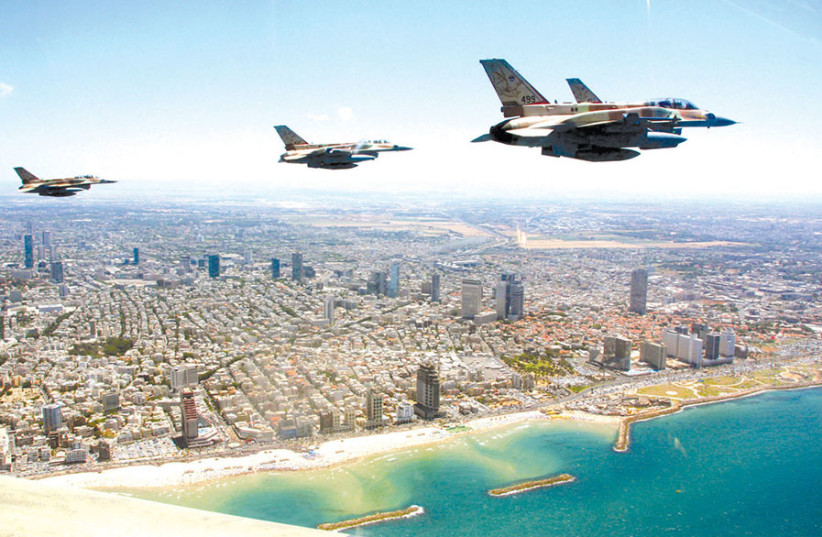Australia/Israel Review
Deconstruction Zone: The prerequisite for peace is Israeli power
Oct 8, 2020 | Yossi Klein Halevi

The peace treaty signed on Sept. 15 by Israel and the United Arab Emirates (UAE) and Bahrain was a retroactive victory over one of the greatest threats Israel ever faced.
Nearly half a century ago, immediately following the 1973 Yom Kippur War, Arab oil producers imposed a boycott on nations considered pro-Israel. In the US, Canada, England, the Netherlands and Japan, long lines formed at the petrol pump. Almost all of Africa severed relations with Israel. Western Europe began its pro-Palestinian tilt not because of a sudden moral awakening but because of the threat of an oil cut-off.
There was no greater strategic threat to Israel than Arab oil, which was effectively turning it into a pariah state. The mood in Israel and throughout the Jewish world was bleak. Elie Wiesel wrote an op-ed in the New York Times cautioning Jews against despair. Cynthia Ozick wrote an essay for Esquire titled, “All the World Wants the Jews Dead.”
The culminating moment of the Arab oil boycott came on Nov. 10, 1975, when the UN General Assembly voted to declare Zionism a form of racism.
Today, Israel has a peace treaty with the UAE, one of the world’s major oil producers, and with oil-rich Bahrain. And the agreement is being quietly blessed by Saudi Arabia. Peace with Israel is being driven by the same forces that once led the campaign against its legitimacy.
Ironically, even as large parts of the Arab world come to terms with a Jewish majority state, the opposite process is happening in the West. The Arab boycott of Israel is over; BDS [the Boycott, Divestment and Sanctions movement] lives.
The peace agreement with the UAE and Bahrain reassures Israelis that they will prevail against BDS too.
The signing is a belated vindication of the 1979 Egyptian-Israeli peace agreement. After the Yom Kippur War, Egypt’s President Anwar Sadat concluded that Israel would never be defeated militarily. After all, Yom Kippur was the Arab world’s best shot at destroying Israel. Yet a two-front surprise attack ended with the IDF within firing range of Cairo and Damascus.
Today’s peace agreement confirms the core message of the Egyptian-Israeli peace agreement: The prerequisite for Middle East peace is Israeli power.
Israeli power is driving this peace. In its fear of Iran and Turkey, both of which seek to dominate the Middle East, the Arab world is turning to Israel.
Israel’s economic power is an additional incentive: This is an alliance of countries focused more on the future than the past.
But it is not only Israeli power that made this agreement possible, but Israeli pragmatism. The breakthrough happened when Prime Minister Binyamin Netanyahu agreed to rescind the threat of unilaterally extending Israeli sovereignty to large parts of the territories. In other words: The leader of the Israeli Right effectively granted an Arab country a say in its internal decision-making. Settler leaders have denounced that decision as a betrayal of Israeli sovereignty. But it is an essential affirmation of the logic of this time: Israeli security is enhanced by regional interdependence.
And the Palestinians? They have lost their veto power over peace, and that too is an Israeli victory. Even as they lose their most powerful allies, Palestinian leaders continue to respond with the failed politics of rejectionism and a culture of hatred.
Only an unequivocal Palestinian offer to confine the “right of return” to a Palestinian state and remove the threat of undermining Israel’s Jewish majority can convince large numbers of Israelis to again consider a two-state solution. The Palestinians must choose between “return” and statehood. Yet no Palestinian leader is willing or able to speak that truth to his own people.
Still, the peace agreement with the Gulf states doesn’t absolve Israel of the need to reach out to the Palestinians.
Especially today, an Israeli leader should appeal to our Palestinian neighbours from the heart, acknowledging their suffering, and offering, together with our new allies in the Arab world, a way out of a century of conflict.
Along with power, then, there is one more prerequisite for ending the conflict: Israeli wisdom and generosity.
That won’t likely happen today. Resolving this conflict awaits a new generation of Israeli and Palestinian leaders.
Is it possible? If you had told me half a century ago that normalisation with Israel would be driven by Arab oil producers, and that the wealth created by oil would motivate Arab nations to seek common cause with an economically powerful Israel, I would have smiled and dismissed you as a fool.
Yossi Klein Halevi is a senior fellow at the Shalom Hartman Institute. His latest book, Letters to My Palestinian Neighbor, is a New York Times bestseller. © Times of Israel (www.timesofIsrael.com), reprinted by permission, all right reserved.
Tags: Gulf states, Israel, Middle East, Palestinians






